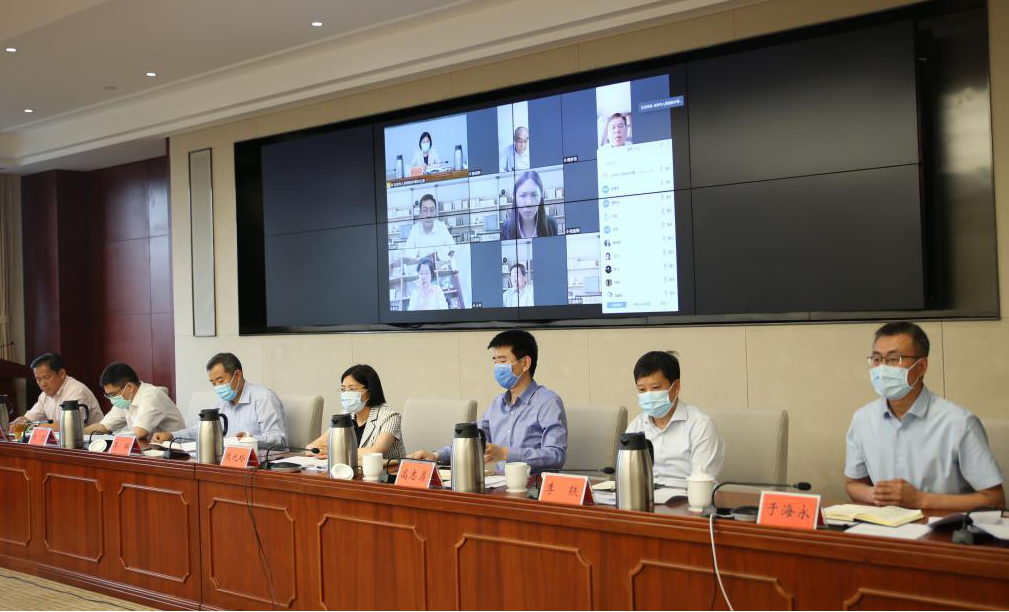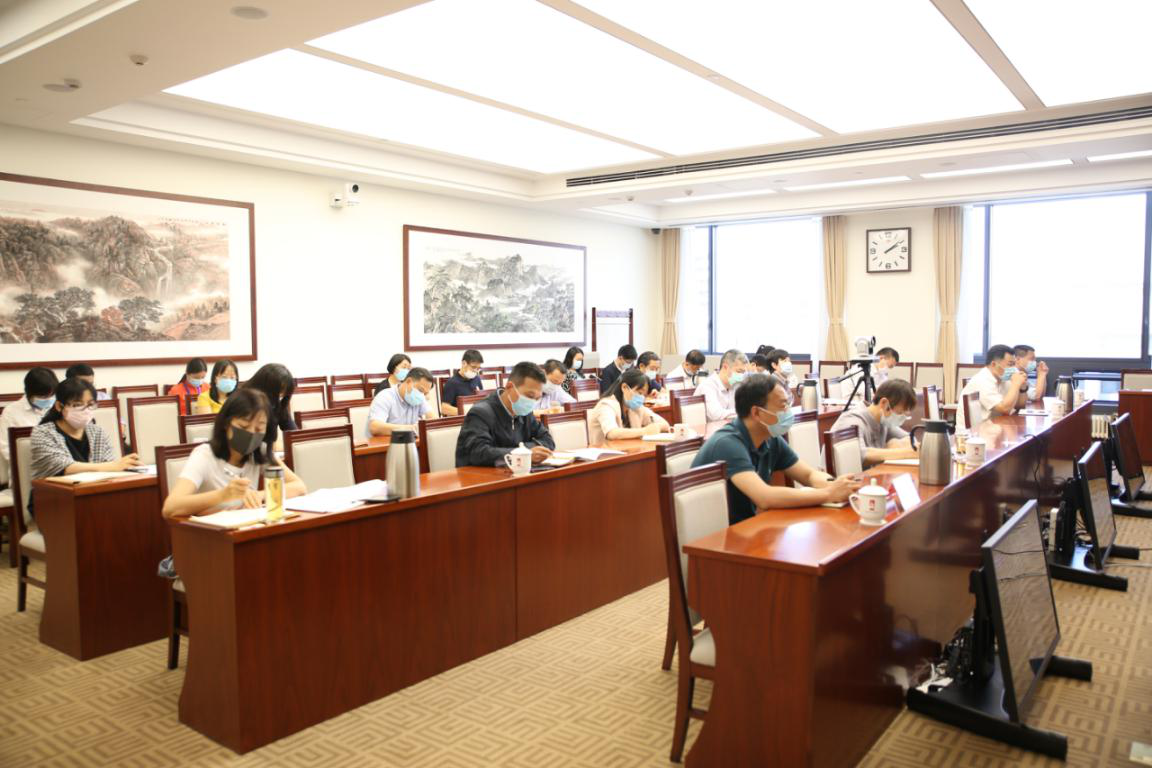
On May 28, the Office of Foreign Affairs Committee of CPC Beijing Municipal Committee and Foreign Affairs Office of the People's Government of Beijing Municipality held an online seminar on how to improve Beijing's role as an international exchange center. The event brought together eleven experts from the think tank of promoting Beijing's role as an international exchange center who offered their advice from different perspectives.
I. Actively dealing with the impact of COVID-19
International exchanges: Fu Mengzi, Vice President of China Institutes of Contemporary International Relations (CICIR), held that in the face of the epidemic, we should actively use cutting-edge technologies, including AI, IoT, cloud contact and global remote synchronous video conferencing, to facilitate international exchanges. Professor Zhong Xin from Renmin University of China suggested building a virtual platform for international exchanges to carry out "city-level diplomacy".
Service for major international events: Liu Bo, head of the Institute of Foreign Studies of Beijing Academy of Social Sciences, noted that in the post-epidemic period, new working mechanisms should be created to provide regular services and guarantee for important state events, and smart technologies should be adopted to establish a smart service and guarantee system featuring high efficiency, multiple languages and minimal contact. He also advised strengthening experience sharing with Tokyo on how to prepare for international events amid the epidemic, so as to make preparations for the shift in advance. Liu also emphasized the importance of furthering the study of online conferences and exhibitions.
Facility construction: Fu Mengzi proposed to improve the layout in the city and its surrounding areas and enhance interconnectivity of the city's technological systems, while Liu Bo suggested adding "epidemic prevention and control elements" to the functions and facilities for international exchanges.
II. Continuously deepening and expanding functional layout
Zhou Xinyu, Secretary General of the Center for Public Diplomacy Studies, Beijing Foreign Studies University, put forth the idea of 3D development of Beijing's international exchanges, namely the three dimensions of capital, city and axis. Fu Mengzi added that building an international exchange center is closely related with city construction, the two of which complement and promote each other. Cheng Manli, head of the National Institute of Strategic Communication, Peking University, said Beijing's infrastructure construction should focus on capability building to enhance its carrying capacity and ability of resource allocation. The government should pay close attention to the convenience for residents and the availability of various service resources, establishing and improving the modern service system in the city.
III. Implementing spatial layout in detail
According to Zhou Xinyu, focusing on functional development in building an international exchange center is a substantial innovation and breakthrough, and space, as the carrier of functions, can break down, specify and materialize the functions. Under the overall layout of "one core, two axes, multiple sections", each district should elaborate on its own layout, pinpoint its specific functions based on actual geographical and spatial conditions, and build a sustainable and shared big data network that is easy to develop, so as to provide data input for developing the functions of an international exchange center.
IV. Enriching and expanding city-level diplomacy
Lu Peixin, former Acting Director General of the Protocol Department of the Ministry of Foreign Affairs and Chinese Ambassador to the Republic of Slovenia, suggested highlighting the importance of "people-to-people diplomacy" and "cultural diplomacy" in international exchanges by leveraging Beijing's rich cultural resources. Professor Li Yonghui from Beijing Foreign Studies University considered it important to create new channels and approaches for Beijing's international exchanges and encouraged technological and cultural associations to further international exchanges in a more professional way. Li Xinyu, Vice President and Secretary General of China International Council for the Promotion of Multinational Corporations, suggested building a museum featuring sister cities of Beijing as a base for sister-city interactions and for the display of sister cities' history, culture and customs. Innovative and ceremonious nameplates of sister cities could be erected at specific locations to show the function and role played by sister cities in developing Beijing into an international exchange center. With these, Beijing as an international exchange center will evolve into an open, inclusive, friendly and harmonious platform integrating hard power, soft power and smart power.
V. Intensifying the building and promotion of city image
Lu Peixin stressed that intensifying publicity and promotion among foreign embassies, international organizations and foreign journalists in Beijing is an indispensable "soft" element of international exchanges. Li Xinyu proposed organizing activities such as International Students Day to attract foreign students to participate in Beijing's development as a center for international exchanges and invite them to contribute ideas and suggestions. Fu Mengzi said foreign-related administration in the post-epidemic era should remain "solemn, open and inclusive" to maintain the capital city's image.
IV. Bolstering the supportive factors system
With regard to intelligent support, He Maochun, Counsellor of the State Council and Director of the Center of Economic and Diplomatic Studies, Tsinghua University, suggested Beijing establish an institute dedicated to the research into international exchange center, and organize central and local think tanks, colleges and other intelligent resources to carry out open studies. Wang Hua, Deputy Secretary General of China Foundation for Peace and Development and former Chinese Ambassador to the Republic of Guinea-Bissau, advised leveraging existing think tanks to carefully study major projects, arrangements and activities, and to pool wisdom and make well-informed decisions. Regarding financial support, Zhou Xinyu emphasized the importance of forming an investment fund to finance facility construction, database development and talent cultivation. In terms of legal support, Liu Bo called for the promulgation of regulations on promoting international exchanges. As to talent support, Zhou Xinyu believed we should both rely on existing talents and foster new talents. On the one hand, we must have a clear idea of existing talents in Beijing, build classified databases for them and establish a coordination mechanism for talent sharing. On the other hand, we can work with colleges to cultivate professionals with a specialized knowledge in the area.

Xiong Jiuling, Director General of the Office of Foreign Affairs Committee of CPC Beijing Municipal Committee and Foreign Affairs Office of the People's Government of Beijing Municipality, said that to promote Beijing's role as a center for international exchanges in the 14th Five-Year Plan Period, we must intensify overall planning, elaborate on the theoretical framework of "four functions" and "six platforms", and keep enriching the functions as we move forward. She urged the experts to keep contributing their ideas and thoughts, find the right entry points to make substantial progress, find out the paths and solutions to overcome key difficulties, and play an active role in promoting work in this respect.


